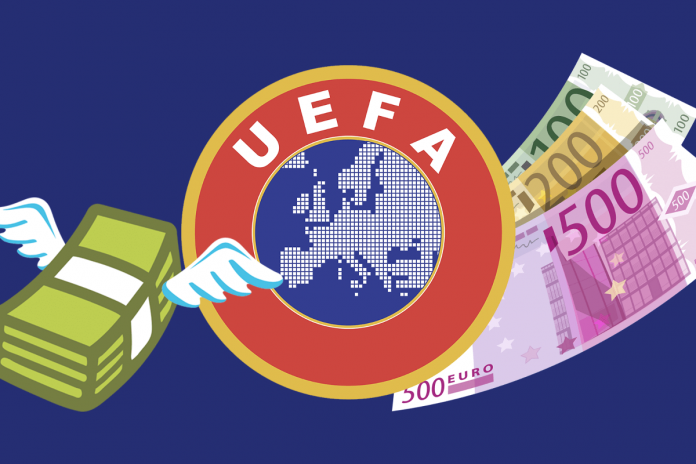This article is written by Siddhant Swain, from NMIMS Kirit P Mehta School of Law, Mumbai.
When the Court of Arbitration for Sport (CAS) decided to lift the two-year ban from UEFA Champions League, imposed on Manchester City Football Club (MCFC), it represented a shocking defeat to the European football’s governing body, UEFA. The FFP Rules are structured in a way where the cash rich football clubs do not run into losses by overspending on players. They also regulate that the owners do not violate any commercial agreements by going around the rules and pumping cash into the club. The investigation by UEFA spanned a whole year and concluded with findings that the Premier League club has committed “serious breaches” of the FFP regulations between 2012-2016.
As a result, UEFA banned Manchester City from participating in their premium football competition, the Champions League for two coming years i.e. 2020-2021 and 2021-2022 season and slapped a mammoth fine of 30 million Euros. But, a 3-day hearing by the independent CAS panel, dismissed the punishment and reduced the penalty to 10 million euros for obstructing and “strongly condemning” the club’s actions for failing to cooperate with the investigation conducted by UEFA’s investigative body, the Club Financial Control Body (CFCB). This article will deal with the important parts and merits of the judgment delivered by CAS and its implications on the FFP Rules and why there is an urgent need of overhauling the existing FFP rules.
The Club Licensing Financial Fair Play Regulation Rules (CLFFPR), were introduced by the Union of European Football Association (UEFA) in the year 2011-12, to provide for sanctions to be taken against clubs who exceed spending, over several seasons, within a set budgetary framework. These regulations are designed to stop clubs running into huge losses by overspending and also provides a framework where, simply put, the club runs and conducts its’ dealing with whatever the budget has been set. The rules also ensure sponsorship deals are based on their real market value and are genuine commercial agreements and not ways for owners to pump cash into a club to get around the rules. The charges levied on by the adjudicatory chamber of UEFA were that, on 14 February 2020, the adjudicatory chamber determined that equity contributions in an amount of at least GBP 204,000,000 provided to MCFC by its ultimate owner were disguised as sponsorship income so that they would be falsely reflected in the financial statements and counted with the break-even calculation as relevant income for monitoring purposes. It held that MCFC had thereby contravened Articles 13 (general responsibilities of the license applicant), 43 (declaration in respect of participation in UEFA Club competitions), 47 (annual financial statements), 51 (written representations prior to licensing decision), 56 (responsibilities of the licensee), 58 (notion or relevant income or expenses) and 62 (break-even information) of the CLFFPR.
Thus, it was held that MCFC would be excluded from participation in UEFA Club Competitions for the next two seasons and penalized to the extent of EUR 30,000,000. The decision was appealed by MCFC. The judgment by the adjudicatory chamber of the UEFA, stemmed from the investigation conducted by CFCB in March 2019, after the publication of ‘Football Leaks’ documents which led to allegations that the owners of MCFC have inflated sponsorship agreements to comply with FFP. CAS, over its weighted 93-page judgment, concluded that the leaked mails can be used as evidence but the transactions did not violate any of the UEFA’s rules. Furthermore, the leaked mails were circulated internally and nothing was routed through or sent to the sponsors. In respect to the breaches brought forward by UEFA, some of them which were dating back to 2014, were time barred, according to the limitation period of UEFA i.e. a five-year limitation period. Now, initially when the decision was pronounced, it seemed devoid of any logic as to why the acts of the owners of MCFC have not been thoroughly put under the knife, but over the course of the judgment by the CAS, there were some glaring loopholes in the UEFA’s current CLFFP Rules.
First of all, there was no conclusive evidence that City disguised funding from their owner as sponsorship, despite the CFCB initial verdict. The time barred defense of City’s sponsorship agreement played a major role in the outcome of the decision and such a loophole should be looked into and repaired by UEFA in the future. Since the inception of the FFP Rules, UEFA and other footballing governing bodies have remain committed to uphold the regulations, so as to regulate the finances and expense made by clubs, but as admitted by the UEFA President, Aleksander Ceferin, the governing body has to repair and modify the rules in order to make the world’s biggest football leagues more competitive. The stats highly indicate domination of mega rich clubs in Europe’s premier leagues. Although sticking to its objective of promoting “fairness” in the footballing market, regulations can be relaxed in order to curb the domination of football leagues. Pertaining to the current decision by the CAS, in favour of MCFC, it appears that the club has been bailed on grounds of technicality and UEFA’s rigid rules. Manchester City were fined EUR 10,000,000 for not cooperating with the CFCB for obtaining evidence as the panel stated that, “It is not in dispute that UEFA is largely dependent on the cooperation of football clubs in obtaining evidence for violations of the CLFFPR…”
Since this duty of cooperation, as stated forth in Article 56, was not complied by the Club, the consequences will be borne by the club but the large sentiment of the public remains against the decision of CAS, as the social media platform went into overdrive mode, in the aftermath of the decision. Experts like John Shea, a senior associate at law firm Lewis Silkin believes that UEFA may want to look at its own process. “Whilst the panel found that the alleged inflated sponsorships with Etisalat were time barred under FFP Regulations, the allegations by UEFA of inflated sponsorship income from Etihad Airlines was actually deemed by CAS to not be time-barred”. Fans, managers and heads of football associations around the world have voiced their dissent at the judgment, which gives UEFA, a food for thought about the loopholes and the tracks to be covered in their own rules. In addition to that, UEFA might also need to look into the investigation procedures as the CAS panel found the leaked internal emails, constituted as admissible evidence. Earlier, Paris Saint-Germain appealed to the Swiss Court against reopening an investigation into alleged FFP breaches. Not drawing parallels in both the cases of the clubs, but, the investigation procedure rules by UEFA also need a look in it. UEFA can appeal the decision of CAS to Swiss Federal Tribunal, but the matter has now cooled off. Summing up, the time barring rules, along with the irregularities in the investigation procedures by UEFA need an overhaul or atleast a revamp to maintain control over the very purpose it was laid out for- fairness and transparency. The author believes that this case will form an integral part of jurisprudence. Although, the jury is still out on the decision by the CAS, but it is in best interest for all the stakeholders to. just have a proper and tight framework of rules, which does not lead to any such cases in future.
References
- CAS 2020/A/6785 Manchester City FC v. UEFA
- Smith, R., 2020. Manchester City Won. Now Brace For The Losses.. [online] Nytimes.com. Available at: <https://www.nytimes.com/2020/07/13/sports/soccer/man-city-ffp.html> [Accessed 8 August 2020].
- Hellier, D., 2020. Bloomberg – Are You A Robot?. [online] Bloomberg.com. Available at: <https://www.bloomberg.com/news/articles/2020-07-13/abu-dhabi-s-manchester-city-escapes-champions-league-ban> [Accessed 9 August 2020].
- Sportstar. 2020. No Evidence Man City Broke FFP Rules But It Failed To Cooperate: CAS. [online] Available at: <https://sportstar.thehindu.com/football/man-city-ffp-breach-uefa-ban-removed-cas-judgement/article32218177.ece> [Accessed 9 August 2020].
- Sportstar. 2020. UEFA Financial Fair Play Rules Set To Change After City Ban Overturned. [online] Available at: <https://sportstar.thehindu.com/football/uefa-financial-fair-play-rules-to-be-changed-manchester-city-ban-cas-appeal-ffp/article32068321.ece> [Accessed 10 August 2020].
- 2012. UEFA Club Licensing And Financial Fair Play Regulations. 1st ed. [eBook] Geneva: UEFA. Available at: <•https://www.uefa.com/MultimediaFiles/Download/Tech/uefaorg/General/01/80/54/10/1805410_DOWNLOAD.pdf> [Accessed 10 August 2020].
LawSikho has created a telegram group for exchanging legal knowledge, referrals and various opportunities. You can click on this link and join:
 Serato DJ Crack 2025Serato DJ PRO Crack
Serato DJ Crack 2025Serato DJ PRO Crack










 Allow notifications
Allow notifications


